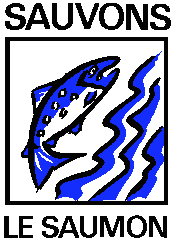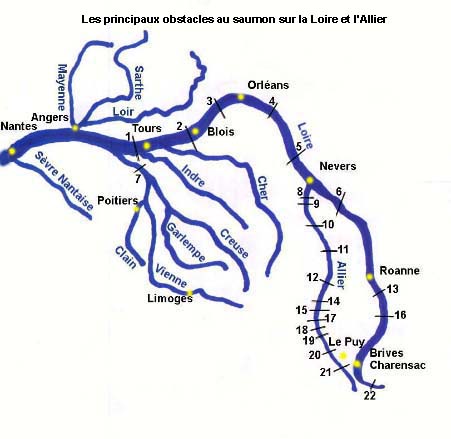 |
|
 |
|
Dams, power stations, bridges : the Loire and Allier rivers are doted with all kinds of hindrances which delay or prevent the migration of the last Atlantic salmons. The map below shows the main obstacles but, as you may guess, it is incomplete : small dams are very numerous. We must also remember that organic and chemical pollution as well as the million ton of slime in the estuary - the « muddy cork »- form a major obstacle to salmon migration.

- 1. The riffle of the Wilson bridge in Tours is daming the Loire river. This riffle was caused by the over-extraction of gravels in the river bed.
- 2. The fish ladders of the mobile dam of Blois (built in 1969) have never worked. Since 1983, the floodgates are only opened in summer, which may prevent late migrations.
- 3. 65 m3/s are diverted from the Loire river to cool the reactor of the St-Laurent-des-Eaux nuclear plant. This hinders young salmons on their way to the sea in springtime.
- 4. The Dampierre nuclear plant can be easily passed by salmons thanks to an opening on the right bank but the water level has to be high enough.
- 5. The Belleville nuclear plant is more and more difficult to pass because of the deepening of the river bed caused by extraction of gravels. It is however equipped with two fish ladders.
- 6. Decize dam.
- 7. Maisons-Rouges. This dam had been obstructing the Vienne river since the beginning of the century. Numerous spawing grounds (a fifth a the whole Loire basin) were not accessible It has been demolished in november 1998. A first salmon has been observed upstream this point in august 1999 !
- 8. The Guétin « bridge-channel ». The first obstacle for salmons on the Allier river. It is 1,5 m high and is easily passed.
- 9. The Lorrains dam.had been built in 1840 and was modernized in 1950. It is not high and does not create any problems.
- 10. In Moulins, the Allier river flows under the Règemortes bridge.that becomes unpassable when the water level is low.
- 11. The « dam bridge » of Vichy had long been a obstacle for salmon migration. It is now much more easy to pass thanks to improvements made according to the « Plan Loire Grandeur Nature ».A fish ladder, equipped with an observatory, has been built. People can now watch salmons and other migratory fishes on their way upstream.
- 12. Madeleines. This small obstacle is easily passed by salmons.
- 13. Villerest dam. It is 70 meters high and is totally unpassable. The reservoir water is seriously eutrophic.
- 14. The Vezezoux dam, which was previously used by the thermal power station of La Taupe had not been equipped with fish ladders. It is very difficullt to pass in spite of a small breach on the left bank.
- 15. The Bajasse dam was built in 1312. It is used for leisure purposes and is equipped with an efficient fish ladder.
- 16. Grangent dam.This EDF (National Electricity Company) building is 70 meters high. It is totally unpassable and has drowned wonderful gorges of the Loire river. More than a million ton of toxic mud has been accumulated behind the water gates so that the draining is very difficult.
- 17. The small power plant of Vieille-Brioude and the Lavoûte-Chilhac dam are private dams which are about 2 meters high. They are not equiped with fish ladders and constitute a major obstacle.
- 18. The small power-station of Langeac was built in 1991.It is equipped with a disfonctional fish ladder.
- 19. Poutès-Monistrol hydroelectric power station.This is the most controversial obstacle. It is responsible for 90% of the loss of Atlantic salmon in the Loire and Allier river. Fifty two years after it was built, it has been equiped with a fish ladder next to the Monistrol factory and of a slide for young salmons on the dam itself. It is also in 1993 that the minimun authorized flow has been raised to 2,5 m3/s, which gives more chances to salmons to reach the spawning grounds.
- 20. St-Etienne du Vigan hydroelectric dam. Built at the end of last century, it has prevented the migration towards the best spawning grounds of the Allier river. It has been destroyed in June 1998 as a part of the « Plan Loire Grandeur Nature ».
- 21. Ten kilometers upstream the St-Etienne du Vigan dam, the Naussac 2 dam has been recently built. It costed 300 million french francs, pumps 100 million tons of water each year to inject it in the Naussac reservoir, which contributes to throw the upper Allier water pattern out of balance.
- 22. Lapalisse dam. This hydroelectric complex pumps water in the Loire river.for turbines and then sends it to the Ardèche river. It thus maintains a minimal water level in this river and enables an intensive practice of canoeing in the Ardèche valley.
Ces pages et leur contenu sont © Copyright de European Rivers Network.
